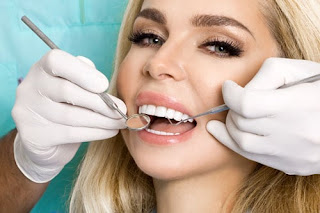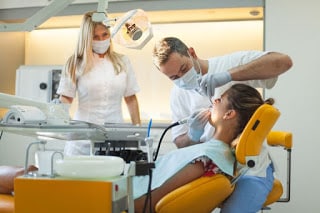Maintaining oral hygiene goes beyond preserving a radiant smile and ensuring fresh breath. In fact, isn't it intriguing that your oral health acts like a telltale sign, vividly portraying your overall health status? Delving deeper into this connection might reveal surprising correlations you never knew before.
It’s said that the relationship between oral health and general health isn't unilateral yet mutual. Just as your general health can ripple into your oral health, your oral health can toss its influence back onto your overall well-being.
For those in the United States, particularly in Massachusetts, searching for expert dental care and guidance, Great Hill Dental - Braintree or another reputable dental clinic in your location may be an exemplary choice. Their proficient team of dental health professionals is dedicated to promoting oral health as a vital component of overall health.
Moving forward, this post will put the spotlight on the strong ties between oral health and general health. So, stick around to uncover what these oral health clues could tell about overall well-being.
1. The Mouth: Gateway To Your Body
Consider your mouth as a bustling hub of bacteria. While this might sound alarming, it's perfectly normal, and most of these microorganisms mean no harm.
Like a well-guarded fortress, your body possesses natural defenses that, together with conscientious oral care rituals like daily brushing and flossing, keep bacterial growth in check. Yet what happens when these hygiene practices fall by the wayside? The balance can tilt in favor of harmful bacteria, giving them a chance to thrive unchecked. Dangerous bacterial bloom can result in oral health issues such as tooth decay and gum disease.
Nevertheless, the role of the mouth extends beyond being just a battlefield for bacteria. Acting as a significant gateway, your mouth can provide insightful glimpses into the internal workings of your body. Your oral health could echo the state of your overall health, meaning that signs and symptoms in your mouth could hint at issues elsewhere in your body. Therefore, the mouth plays an integral part in eating, communicating, and gauging overall health.
2. The Oral-Systemic Link: What's The Connection?
The ‘oral-systemic link’ theory suggests a strong interconnection between oral and overall health. This theory proposes that events in your mouth can create ripples throughout your body; similarly, changes in your overall health can echo back into your mouth.
As a case in point, researchers unearthed connections between the bacteria in your mouth and severe conditions like heart disease, diabetes, and Alzheimer's.
While it may be startling, isn't it worth considering that everyday practices like brushing your teeth could have such profound implications for your health?
Think about it. The mouth serves as the entry point to your digestive and respiratory tracts. So, does it make sense to think that any nasty bacteria or infection in your mouth could find its way to other parts of your body?
And the reverse is true. Some illnesses, like diabetes and HIV/AIDS, can put your body on the back foot when fighting off infections, which can ramp up oral health problems.
3. Gum Disease And Its Far-Reaching Effects
The term gingivitis might ring a bell. While it starts as a mild gum disease, without proper care, it can take a nasty turn and become a severe condition known as periodontitis. These conditions don't just impact your mouth—they can extend their influence, touching various other aspects of your health.
Experts have found that gum disease is potentially associated with severe health conditions such as stroke and heart disease. Additionally, expectant mothers suffering from periodontitis could face higher risks of delivering prematurely or having babies with low birth weight.
These discoveries emphasize that gum health isn't an independent aspect. On the contrary, it can create waves of influence throughout the body, impacting areas of health that may initially seem disconnected.
The astounding reach of gum disease highlights the importance of maintaining good oral hygiene for a beautiful smile and overall health and wellness.
4. Spotlight On The Saliva
People often overlook saliva, yet it truly deserves recognition as an unsung hero of the body. This unassuming liquid does much more than help break down your food for digestion. Acting like a protective sentry, it safeguards oral health in several ways.
One of saliva's key roles is to neutralize the acids that harmful bacteria in the mouth produce. In addition, it helps cleanse the mouth by washing away leftover food particles that could provide a breeding ground for these bacteria. By doing this, saliva aids in averting potential oral infections.
Here's a surprising fact: saliva doubles as a diagnostic ally as well. Saliva tests can provide insights into various health conditions, from systemic diseases like diabetes to hormonal imbalances. A simple saliva test could be like a key, unlocking a treasure trove of information about your overall health.
Saliva is a true multitasker, playing several critical roles in maintaining oral health and overall well-being.
5. Importance Of Regular Dental Checkups
Bi-annual dentist visits encompass more than safeguarding against cavities and maintaining a brilliant smile. Regular dental checkups serve as an essential preventive healthcare measure. They play a pivotal role in the early detection of a variety of systemic diseases, potentially revealing signs before other symptoms have a chance to manifest.
A comprehensive oral examination can uncover more than one might expect. It can expose nutritional deficiencies that might be affecting oral health. To add, oral tests detect microbial infections, hint at immune disorders, and sometimes identify signs of certain cancers.
Final Thoughts
Don't brush aside oral health; it holds significant importance. It's a pivotal cog in the machine of your overall well-being. Let your mouth tell its story and listen to what it says about your health. Remember, a healthier mouth leads to a healthier you.



